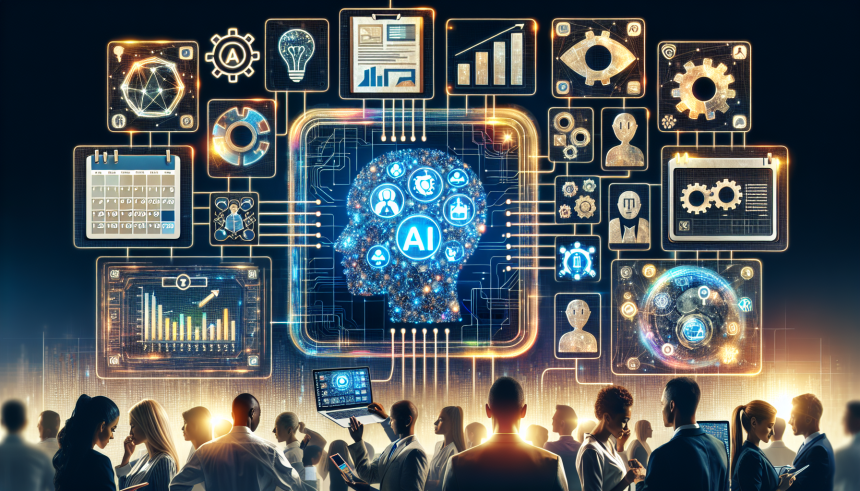Understanding AI-Powered Project Management Tools
AI-powered project management tools are revolutionizing the way teams collaborate and manage projects. By harnessing the power of artificial intelligence, these tools enable organizations to streamline processes, enhance communication, and drive efficiency. As businesses increasingly adopt remote and hybrid working environments, the demand for sophisticated project management solutions grows.
Key Features of AI-Powered Project Management Tools
-
Task Automation
AI tools can automate repetitive tasks such as status updates, reminders, and reporting. This automation reduces the manual workload for team members, allowing them to focus on strategic activities and fostering productivity. -
Data Analytics
AI algorithms can analyze vast amounts of data in real-time, providing insights into team performance, project timelines, and resource allocation. Enhanced analytics support data-driven decision-making. -
Predictive Analysis
AI models can predict potential project risks and delays by analyzing historical data and identifying patterns. This ability enables project managers to proactively address issues before they escalate, ensuring smoother project execution. -
Enhanced Collaboration
Collaboration features powered by AI can facilitate seamless communication among team members. Tools can suggest appropriate team members for specific tasks based on their expertise and availability, ensuring better resource utilization. -
Intelligent Resource Management
AI can optimize resource allocation by analyzing team member capabilities, workloads, and project requirements. This ensures that the right resources are deployed to the right tasks at the right time.
Benefits of AI-Driven Collaboration in Project Management
1. Improved Communication
AI-powered tools often include chatbots and virtual assistants that facilitate instant messaging and updates. This allows team members to stay informed about project progress and field inquiries in real-time, thus enhancing overall communication.
2. Faster Decision-Making
AI’s data analysis capabilities expedite decision-making processes by providing real-time insights and predictive recommendations. This speed is crucial in fast-paced environments where timely decisions can significantly impact project outcomes.
3. Enhanced Accountability
With AI tools, tracking progress and accountability becomes easier. Automated progress reports reflect individual contributions and project milestones, encouraging team members to remain accountable for their tasks.
4. Scalable Solutions
AI-powered project management tools are highly scalable, allowing organizations to adjust functionalities as their needs evolve. This scalability ensures that tools can grow alongside the organization, accommodating increasing team sizes and project complexities.
AI-Powered Collaboration Tools Comparison
1. Asana
Asana integrates automation features that facilitate task management and deadline tracking. Its AI capabilities suggest optimal task assignments based on team member workload and past performance, making project planning more efficient.
2. Trello
Trello utilizes AI to enhance its card system, leveraging automation to create rules that trigger actions based on card updates. Users can benefit from predictive analytics that forecast project completion timelines based on historical data.
3. Microsoft Project
Microsoft Project employs AI for resource management and predictive analytics, enabling users to assess timeline risks and apply data-driven adjustments to keep projects on track.
AI-Enhanced Collaboration Techniques
1. Virtual Reality (VR) Integration
Emerging technologies like VR can be integrated into project management tools to facilitate immersive collaboration experiences. This enhances brainstorming sessions and project reviews, especially for remote teams.
2. Machine Learning Capabilities
Machine learning algorithms can learn from team interactions and project behaviors over time. These insights help tailor project templates and workflows for future projects, making the process increasingly efficient.
3. Natural Language Processing (NLP)
NLP technology allows AI tools to comprehend and interpret user interactions in natural language. This feature enables users to input data and queries in a conversational manner, making the tools more user-friendly and accessible.
Future Directions for AI-Powered Project Management Tools
As technology advances, AI will continue to reshape project management. The development of more sophisticated algorithms will lead to smarter collaboration tools capable of understanding emotional cues and team dynamics. This increased intelligence can foster deeper teamwork and improved project outcomes.
1. Adaptive Learning
Future AI tools may be designed with adaptive learning capabilities, allowing them to evolve based on team behaviors and project requirements. This ensures that they remain relevant and effective in changing work environments.
2. Integration of IoT
The integration of the Internet of Things (IoT) could provide real-time data streams that enhance project management tools. This capability would enable teams to monitor project progress and resource utilization more accurately.
3. Enhanced Security Features
As data privacy concerns heighten, AI tools will increasingly focus on implementing robust security measures. Advanced encryption protocols and intelligent threat detection systems will become standard features to safeguard sensitive project information.
Conclusion: The Impact of AI on Project Management
AI-powered project management tools represent a paradigm shift in how teams approach collaboration and project execution. From enhanced communication to intelligent resource management, these tools empower teams to operate more effectively. As AI technology continues to develop, its integration into project management will undoubtedly lead to even more transformative benefits, solidifying its role as an essential component of modern business operations.


